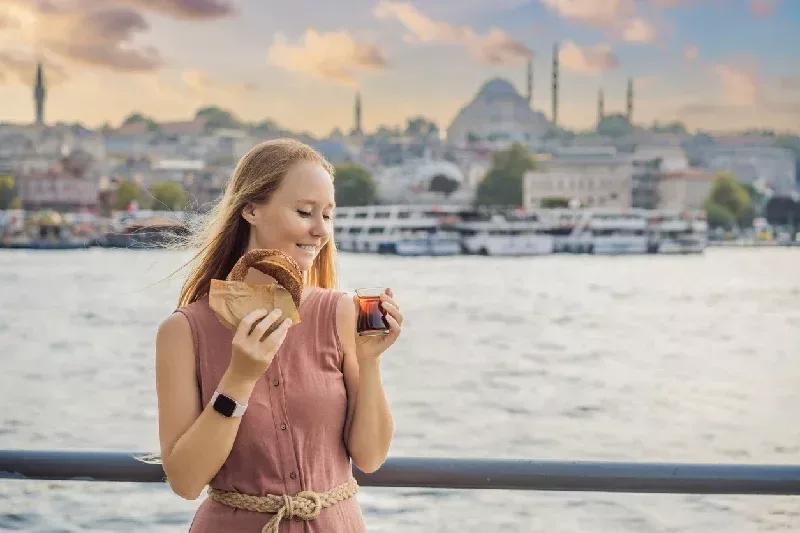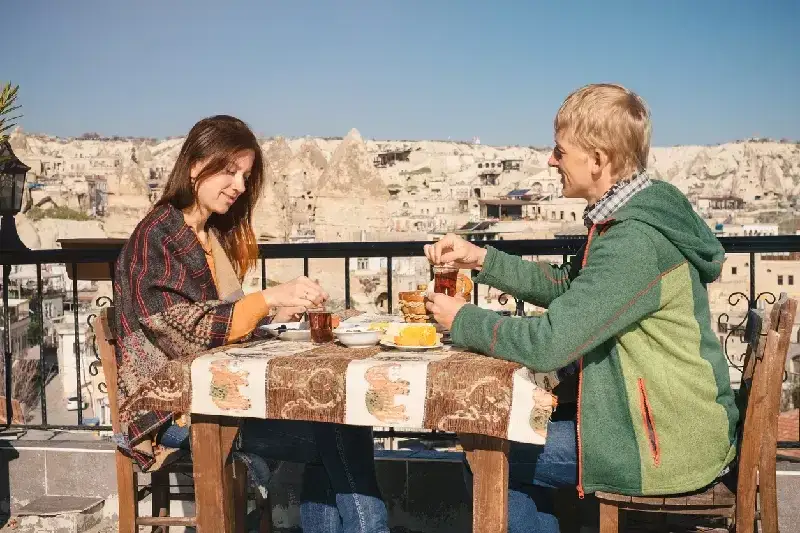Turkish coffee and tea mean much more than simple beverages in Turkey—they represent vital elements of cultural heritage. Turkish coffee is included in the UNESCO Intangible Cultural Heritage listing. A traditional Turkish saying suggests that people remember a cup of coffee "for 40 years," which shows its deep social importance.
These traditional Turkish drinks are the blood of hospitality and social bonding. The bold, aromatic Turkish coffee comes prepared in a special pot called an Ibrik (or Cezve). Turkish tea serves as a welcoming gesture, and both beverages create spaces for meaningful connections. Extensive traditions have unfolded starting from the earliest evidence of coffee drinking in 15th-century Yemen up to the 1640s establishment of the first coffeehouse in Constantinople. Today, these traditions remain an important aspect of daily life, celebrations, and social gatherings throughout Turkey.
A Deep-Rooted Tradition in Every Sip
Tea and coffee are the lifeblood of social bonding in Turkey. These beverages do more than provide a caffeine boost - they are potent symbols of friendship, hospitality, and community identity in Turkish society, making them must-experience traditions on Turkey tour packages.
The Role of Tea and Coffee in Turkish Culture
Tea has captured the Turkish heart despite the country's rich coffee heritage. Turkish people consume four cups a day, and that is why Turkey has the highest per capita tea consumption in the world at around 3.5 kilograms annually. Coffee is consumed after meals by people, which makes for moments of precious bonding with family and friends.
These drinks transcend the role of being simple beverages. As a Turkish proverb states, "A cup of coffee is remembered for forty years," capturing the way that these traditions create memories and strengthen bonds. Coffee and tea have opposing but complementary roles - coffee marks occasions and greets guests, tea maintains day-to-day relationships.
Hospitality and Social Life Around the Table
The tradition of ikram (treating guests) is at the center of Turkish hospitality. Guests are provided with a carefully planned ritual that opens with welcome drinks. It is considered rude to decline tea or coffee upon entering, as to receive these drinks is to agree on a social contract.
Turkish hospitality customs are:
- Special guest rooms with more careful decoration than family living spaces
- Household items (dinner sets, cutlery) reserved only for visitors
- Refreshments served throughout the visit
Tea houses and tea gardens are meeting points that become a site where friendships build among steaming cups of tea. Coffee houses in villages have spots where visitors sit for hours playing cards, chit-chatting, and complaining about their issues in life.
Turkish workplaces must legally provide a minimum of two tea breaks daily. This recognition is testament to the degree to which such drinks pervade Turkish daily existence and cause times to unwind, connect, and maintain the social web that is Turkish society.

Customize Your Dream Vacation!
Get in touch with our local experts for an unforgettable journey.
Plan Your Trip
Turkish Coffee – A Bold, Aromatic Ritual
Turkish coffee is one of the world's oldest methods of brewing and has its origins in the Ottoman Empire. It is a special coffee that requires close attention and pays dividends with a full-bodied, heavy coffee that lingers long after it has been consumed.
How Turkish Coffee is Prepared
Turkish coffee magic begins with beans that grind to an ultra-fine powder - they resemble flour rather than regular coffee grounds. It needs a particular long-handled pot called a "cezve" (or ibrik), which is traditionally crafted by copper or brass artisans. A large teaspoon of coffee (approximately 6g) and cold water are used for one cup, and sugar is added to taste. It should be heated slowly over low heat, and you must not stir after the first blend. There is a dark foam on the surface during warming up of the coffee - a key feature of genuine Turkish coffee. The foam has to be spread slowly into cups when almost boiling, and then the pot is returned to the heat for one last short boil.
Serving Style and Fortune Telling Tradition
It is served in little demitasse cups and along with it, a glass of water is given to cleanse the palate. A sweet is usually served with the coffee, such as Turkish delight (lokum) or chocolate.
Raw grounds settle at the bottom of the cup when they have been drunk and are the basis of kahve falı (coffee divination). It's an old custom that works if you flip your empty cup upside down over a saucer, have a wish, and let the grounds create patterns. They tell stories once cool - birds presage good news, snakes presage enemies, and hearts signify love.

Turkish Tea – The National Drink
Tea rules supreme in Turkey, unlike other countries where coffee dominates. The locals call it "çay" (pronounced chai), and it's the true national drink that people enjoy from dawn till late at night.
How Turkish Tea is Brewed
A special double teapot called "çaydanlık" brews Turkish tea. Boiling water sits in the larger bottom pot while concentrated tea steeps in the smaller top one. People can adjust their tea strength by mixing different amounts of concentrated tea with hot water. The perfect brew takes time - leaves need 15-20 minutes to develop their rich flavor.
The Art of Serving Turkish Tea
The tea comes in special tulip-shaped glasses known as "ince belli" (slim-waisted). These clear glasses show off the tea's deep ruby-red color. Their narrow waist keeps the bottom hot and protects your fingers from the heat. Sugar cubes come with the serving, but adding milk or lemon would raise eyebrows in traditional settings.
Tea Gardens and Daily Life in Turkey
Tea gardens bring communities together all over Turkey. People gather here to play backgammon and chat about their day in these relaxed outdoor spaces. These spots feel like an extension of home, particularly near the coast. Tea shapes the workday rhythm too, as tea servers make their rounds through offices and markets with fresh brews on small trays.

Black Tea vs Herbal Tea in Turkish Culture
Black tea from the Black Sea region remains the classic choice, though herbal options have grown more popular lately. Tourists love elma çayı (apple tea) for its sweetness. Most Turks still prefer their traditional black tea - it's woven deeply into their cultural fabric.
Coffee or Tea? A Friendly Rivalry
Turkish people share a friendly rivalry between their nation's favorite drinks. Tea and coffee both hold special places in Turkish culture but serve different purposes in daily life.
When and Why People Choose Each One
Tea serves as the everyday drink that keeps Turkish people going throughout their day. Businesses must provide at least two tea breaks daily by law. Coffee marks special moments and people usually drink it after meals or during visits from friends.
Social context plays a big role in choosing between these drinks. People reach for tea during casual conversations. Coffee becomes the drink of choice during moments of reflection or traditional practices, especially when reading fortunes. Turkish homes consider offering either drink the ultimate sign of hospitality.
Regional Preferences Across Turkey
Beverage choices show some interesting geographical patterns. Adana's residents lean heavily toward tea, with 63.3% choosing it as their favorite. İzmir tells a different story, where 53.4% of people prefer coffee. This split between east and west shows İzmir's openness to newer trends.
Coffee drinking habits vary by region too. Adana's residents typically enjoy their coffee once or several times a week, usually at home. İzmir's coffee culture looks different - most people drink 1-5 cups daily and prefer coffee shops. While international chains like Starbucks have gained ground, traditional Turkish coffee remains the most popular variety.

Where to Experience It Like a Local
Savvy travelers find authentic Turkish beverage experiences in establishments where locals gather.
Recommended Cafés, Tea Houses & Markets
Istanbul's historic Mandabatmaz serves exceptional Turkish coffee that's so thick "a water buffalo wouldn't sink in it." This iconic establishment's name perfectly captures its signature frothy brew, which they've prepared on a traditional samovar since 1967. Tea enthusiasts will love Pierre Loti Hill with its breathtaking Golden Horn views. The Grand Bazaar's atmospheric Çorlulu Ali Pasha Medrese delivers an authentic tea house experience and shisha.
Regional brewing traditions come alive at Kings Coffee in Cappadocia and the Coffee Museum in Safranbolu. The Spice Bazaar houses Turkey's most renowned coffee brand, Kurukahveci Mehmet Efendi.
Tips for Tourists to Enjoy Turkish Tea and Coffee
Turkish beverages create connections between people, going beyond mere consumption. Local customs suggest accepting offered drinks, even if you take just a few sips, since declining might seem impolite. Your host will refill your cup automatically when it's less than half full.
Local treats like simit (sesame bread rings) or lokum (Turkish delight) enhance your drinking experience. Turkish coffee's tradition includes a fun ritual - once finished, turn your cup upside down on the saucer and let the grounds create patterns that others can interpret as fortunes.

FAQS
Q1: What makes Turkish tea different?
Turkish tea stands out for its unique brewing method using a double teapot (çaydanlık), which creates a strong, flavorful black tea.
Q2: What is the etiquette for tea in Turkey?
In Turkey, offering tea is a symbol of hospitality and friendship. It’s polite to accept a cup when offered, and you’ll often see people drinking it slowly while chatting, rather than rushing through it.
Q3: How do Turkish people drink their coffee?
Traditionally, Turkish people enjoy their coffee strong and unfiltered, served in small cups with the grounds settling at the bottom. It’s usually sipped slowly, often with a glass of water on the side and sometimes a piece of Turkish delight.
Q4: Why is coffee important in Turkish culture?
Turkish coffee is more than just a drink; it’s woven into the culture through centuries of tradition. It plays a role in social gatherings, ceremonies, and even fortune-telling, representing a shared moment of connection.
Q5: When do people in Turkey usually drink tea or coffee?
Tea is enjoyed throughout the day, from breakfast to late evenings, while coffee is often served after meals or during special visits to mark an occasion.

